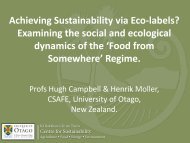Book of Abstract (incl. addendum) - IFSA symposium 2012
Book of Abstract (incl. addendum) - IFSA symposium 2012
Book of Abstract (incl. addendum) - IFSA symposium 2012
Create successful ePaper yourself
Turn your PDF publications into a flip-book with our unique Google optimized e-Paper software.
Workshop 1.1 Knowledge flows in pluralistic research and advisory systems: how do advisors<br />
keep up-to-date and to what extent is their advice evidence-based?<br />
Convenors:<br />
Laurens Klerkx and Pierre Labarthe<br />
The role <strong>of</strong> advisory services in bridging science and farmers’ practices seems crucial in a context <strong>of</strong><br />
diversification <strong>of</strong> challenges faced by agriculture regarding public goods issues; together with an<br />
exponential growth <strong>of</strong> academic publications related to these various challenges. The risk <strong>of</strong> an<br />
increasing gap between science and advisory practices at field level is <strong>of</strong>ten stressed by various<br />
stakeholders at both sides. We propose to discuss about how different institutional configurations <strong>of</strong><br />
Agricultural Knowledge Systems tackle (or not) this challenge in various countries.<br />
Beyond fragmentation and disconnect: networks for knowledge sharing in<br />
the English land management advisory system<br />
Laurens Klerkx and Amy Proctor<br />
Wageningen University<br />
Laurens.Klerkx@wur.nl<br />
The growing multifunctionality in agriculture, combined with privatisation <strong>of</strong> previously state-funded<br />
agricultural extension services, has resulted in a pluralistic land management advisory system. Despite<br />
benefits in terms <strong>of</strong> increased client orientation and greater advisor diversity, it is argued that these<br />
changes have resulted in the fragmentation <strong>of</strong> the land management advisory system and a reduction <strong>of</strong><br />
interaction within the advisory system and between the advisory system and science. Hence, concerns<br />
have been voiced as regards the capacity <strong>of</strong> the advisory system to be able to incorporate new<br />
knowledge and skills to <strong>of</strong>fer adequate advisory services, resulting in a growing interest in how<br />
advisors obtain and construct the knowledge and skills necessary for <strong>of</strong>fering adequate advisory<br />
services to their clients. In this paper we explore how advisors (land agents, applied ecologists and<br />
veterinarians) develop their knowledge and skills by engaging in different kinds <strong>of</strong> networks. Key<br />
findings suggest that advisors draw upon informal ‘communities <strong>of</strong> practice’ within their own advisory<br />
pr<strong>of</strong>ession, but also draw upon broader ‘networks <strong>of</strong> practice’ involving multiple advisors from<br />
different advisory pr<strong>of</strong>essions, resulting in knowledge sharing, brokered around the complex queries <strong>of</strong><br />
clients. Whereas fragmentation and disconnect due to competition and epistemological differences do<br />
play a role; they do not appear to prevent overall knowledge sharing among advisors within and across<br />
different pr<strong>of</strong>essions. Assumptions <strong>of</strong> a collapse <strong>of</strong> interaction within the land management advisory<br />
system are not supported by the evidence. However, to optimize interactions between pr<strong>of</strong>essions, and<br />
between advisors and the science systems, informal or formal brokers in the form <strong>of</strong> pr<strong>of</strong>essional<br />
associations or other organizations could play a bigger role.<br />
Privatization <strong>of</strong> extension services: which consequences for the quality <strong>of</strong><br />
the evidence produced for the farmers?<br />
Pierre Labarthe, Faïz Gallouj and Catherine Laurent<br />
INRA, France<br />
Pierre.Labarthe@agroparistech.fr<br />
This paper aims at better understanding the consequences <strong>of</strong> the privatization <strong>of</strong> extension services on<br />
the quality <strong>of</strong> the knowledge produced for and with the farmers. The originality <strong>of</strong> the study is that it<br />
does not focus on the front-<strong>of</strong>fice dimension <strong>of</strong> the services (the direct interactions between farmers<br />
and advisers), but rather on the back-<strong>of</strong>fice one (R&D investments in field and experimental trials,<br />
scientific watch, training, etc.). In that respect, we combined two analytical frameworks: i) the<br />
advances <strong>of</strong> service economics, which allow to better understand the strategies <strong>of</strong> private firms <strong>of</strong><br />
extension services; ii) the debates derived from evidence-based policy approaches in public decision,<br />
11











